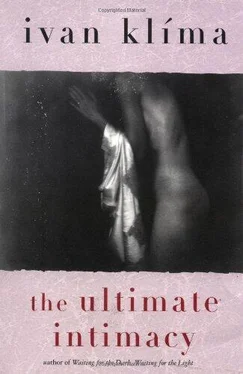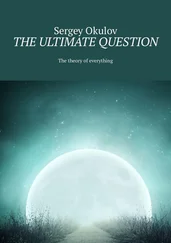Ivan Klima - The Ultimate Intimacy
Здесь есть возможность читать онлайн «Ivan Klima - The Ultimate Intimacy» весь текст электронной книги совершенно бесплатно (целиком полную версию без сокращений). В некоторых случаях можно слушать аудио, скачать через торрент в формате fb2 и присутствует краткое содержание. Год выпуска: 1998, Издательство: Grove Press, Жанр: Современная проза, на английском языке. Описание произведения, (предисловие) а так же отзывы посетителей доступны на портале библиотеки ЛибКат.
- Название:The Ultimate Intimacy
- Автор:
- Издательство:Grove Press
- Жанр:
- Год:1998
- ISBN:нет данных
- Рейтинг книги:3 / 5. Голосов: 1
-
Избранное:Добавить в избранное
- Отзывы:
-
Ваша оценка:
- 60
- 1
- 2
- 3
- 4
- 5
The Ultimate Intimacy: краткое содержание, описание и аннотация
Предлагаем к чтению аннотацию, описание, краткое содержание или предисловие (зависит от того, что написал сам автор книги «The Ultimate Intimacy»). Если вы не нашли необходимую информацию о книге — напишите в комментариях, мы постараемся отыскать её.
The Ultimate Intimacy — читать онлайн бесплатно полную книгу (весь текст) целиком
Ниже представлен текст книги, разбитый по страницам. Система сохранения места последней прочитанной страницы, позволяет с удобством читать онлайн бесплатно книгу «The Ultimate Intimacy», без необходимости каждый раз заново искать на чём Вы остановились. Поставьте закладку, и сможете в любой момент перейти на страницу, на которой закончили чтение.
Интервал:
Закладка:
Matouš should feel relieved and light-headed at the prospect of a future of calm stretching out before him as well as the fulfilment of his destiny, but instead his legs become heavy.
He walks home, takes off his coat and stretches out on the bed. He lies there for a long time, several hours, gazing up at the ceiling and slowly drags himself through the thicket of hopeless contemplations. On the bedside table there is a jug of wine from the previous day, along with a loaf of bread going stale and a bowl of boiled rice with peanuts. There is no knife to hand so he simply breaks off lumps of bread and slowly chews them. There is also a pile of books by the bed. From time to time he picks up the topmost one and leafs through it for a while before tossing it to one side.
The ceiling is covered in cracks and the dirty threads of cobwebs which flutter in the draught that wafts into the room along with the screech of tram wheels and the din of lorries.
Faces flicker across the greyish surface of the ceiling. Some of them are savage and long forgotten, others are familiar: they are alive, more alive than all the faces of actors and non-actors that move across the television or cinema screens. Women whom he trusted or on whom he even showered love, while knowing they would leave him in the end, scowl and leer at him. He tries to ignore them and to ignore Klára who wantonly tumbles into bed with unknown men.
His thoughts turn to the nurse whom he now takes the liberty of calling Hana. He has already been twice to the church and listened to the confused litanies of her husband, whose aura has already totally disappeared, or possibly Matouš has not been able to concentrate enough to make it out. The time that Matouš was invited to lunch by the minister's wife, he actually had a conversation with the minister. He had felt an unconscious need to take issue with that follower of the resurrected Christ. Did the minister know that the Chinese, the worlds most populated nation, had managed to get by without believing in a god and yet the people did not live any less morally than in those places where they acknowledged a god or gods? The minister was aware of this. In the East, he said, there was less individualism and people were more obedient to an order that had been established over centuries.
Did that mean that concepts of a god or gods and an immortal soul
were simply products of our individualism, of our reluctance to countenance the extinction of our own selves?
The minister said that was not what he had in mind, although anxiety about the extinction of the self certainly played a role in our notions of God.
The minister was either incredibly conciliatory or was consumed with doubts of some kind. Either about himself or about God.
Matous has only spoken to the minister's wife a couple of times since he promised her his poems, and he still hasn't taken them to her. He has been waiting for some more suitable moment: he has the feeling that his poems ought to crown his acquaintance with that woman, rather than be an opening gambit.
But on one occasion, when he was feeling particularly bad and Hana brought him his medicine for the second time, he had recited to her some of his poems and told her that she had been the inspiration for them.
Surely not — she replied in astonishment — how could I have?
Just by being you, he told her. There is something mysterious about you, something oriental and mystical.
That's all in your imagination, she commented.
No. My whole life was meaningless until I met you.
You sound delirious, she laughed in embarrassment, and even touched his forehead to see if he had a fever, but she took her hand away before he had time to press it to his forehead.
Now Matouš thinks about that good woman with particular intensity. He thinks about her not only because his solitariness was officially confirmed today, but also because he has an odd premonition that something bad has befallen Hana and that she might perhaps welcome Matous's attention.
He ought to phone her and offer his help should she require it, but at this moment he lacks the will to do anything.
He who does, loses. All we hold we lose in the end.
Matouš falls asleep.
When he wakes up he can hear the boom of the ocean waves and the murmur of the crowd as they watch condemned prisoners being driven away to execution. Curiosity and indifference in the ant heap. Blazing fires.
Then his mothers voice intrudes upon him: Mattie, why aren't you eating? Stop complaining, Mattie, and pull yourself together,
everything's going to be all right again. The touch of his mother's hand stroking his hair.
Matouš realizes that it is a long time since he visited either his mother's or his father's grave. That's bad. It is one's duty to pay respect to those who gave one life, and his mother was the only good woman he had met in his life. Then Matous's thoughts stray once more to another woman, to Nurse Hana, and he realizes that he misses her; he misses her voice and her smile, he misses a mother's love.
At last he gets up, opens the refrigerator and finds in it a piece of dry salami and gobbles it down. Then he opens a can of goulash and with his fingers he fishes out pieces of meat from the unpleasantly smelling sauce before throwing the can into the pedal bin which emits a swarm of flies the moment he opens the lid.
He takes a shower and puts on a clean shirt.
For weeks now his poems have lain waiting on the table in a black binder. He has chosen almost two hundred of them, precisely one hundred and eighty-seven of them, in fact: the ones he feels sure are successful. He resists the temptation to open the binder and read at least the best ones once more — he knows them by heart anyway.
He lifts the receiver and hesitates for a moment before dialling the number of the manse. Luckily enough, the minister's wife answers the telephone.
He announces himself, but apparently she cannot recall his name, as she says: 'I expect you want to speak to my husband. I'm afraid he's in hospital.'
The nurse's voice is unusually sad.
'Anything serious?' he asks.
A heart attack.'
'I hadn't heard. I'm sorry to hear it, Hana. And how is he?'
'Thank you. I think he has got over the worst of it.'
'I'm glad to hear it.' Nurse Hana is wrong, because she believes in some medical gadgetry and doesn't realize that her husband's life force is fading. She doesn't realize she will come into his wealth. It is unlikely she gives it a thought. He therefore says once more, 'I really am glad to hear it, you must have been very worried.'
'I expect you're calling about your poems,' the ministers wife recalls. 'You promised me them ages ago.'
'Only partly. I just had the feeling all of a sudden that something had happened to you, that something was troubling you and I ought to give you a ring.'
'Troubling me? Oh, yes, there's always something troubling one.' The minister's wife remains silent for a moment and he says: 'Everything will be all right again, you'll see.'
'Nothing will ever be the way it used to be,' says the minister's wife and Matouš makes out a quiet sob. Then that good woman forces herself to turn her thoughts from her own distress and ask him what his poems are about.
He says that it is impossible to say in a few words. They are attempts at capturing his moods, but he wouldn't like to bother her with them now, not unless his poems might bring her a little comfort.
Yes, that's something she would need at this moment. From the tone of her voice Matouš recognizes that Hana's thoughts are divorced from her words. None the less he tells her that poetry is there to console. Like music. Or meditation. Or prayer.
'If you like, and if you happen to be passing, you're welcome to drop by with them,' the minister's wife decides all of a sudden.
Читать дальшеИнтервал:
Закладка:
Похожие книги на «The Ultimate Intimacy»
Представляем Вашему вниманию похожие книги на «The Ultimate Intimacy» списком для выбора. Мы отобрали схожую по названию и смыслу литературу в надежде предоставить читателям больше вариантов отыскать новые, интересные, ещё непрочитанные произведения.
Обсуждение, отзывы о книге «The Ultimate Intimacy» и просто собственные мнения читателей. Оставьте ваши комментарии, напишите, что Вы думаете о произведении, его смысле или главных героях. Укажите что конкретно понравилось, а что нет, и почему Вы так считаете.






![Theresa Cheung - The Dream Dictionary from A to Z [Revised edition] - The Ultimate A–Z to Interpret the Secrets of Your Dreams](/books/692092/theresa-cheung-the-dream-dictionary-from-a-to-z-r-thumb.webp)





